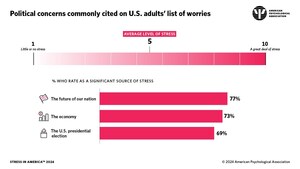APA Applauds Landmark Illinois Law Allowing Psychologists To Prescribe Medications
Becomes Third U.S. State to Enact Prescription Privileges
WASHINGTON, June 26, 2014 /PRNewswire-USNewswire/ -- The American Psychological Association applauded a new law making Illinois the third state in the country to authorize licensed clinical psychologists with advanced, specialized training to prescribe certain medications for the treatment of mental health disorders.
"This is a landmark moment for mental health care," said Norman B. Anderson, PhD, APA's executive vice president and chief executive officer. "Allowing properly trained clinical psychologists to prescribe is a logical step in helping to improve access to quality mental health care for consumers, especially the underserved. And the collaborative approach between prescribing psychologists and physicians in Illinois should help to ensure coordinated patient care."
Introduced by - Sen. Don Harmon (D), president pro tem of the Illinois Senate; Sen. Dave Syverson (R); Rep. John E. Bradley (D); and Rep. Raymond Poe (R), the measure passed the statehouse 94-21 with a concurrence vote in the Senate of 57-0 and was signed by Gov. Pat Quinn (D) on June 25.
Illinois Senate Bill 2187 requires that licensed clinical psychologists in Illinois who want to prescribe successfully complete advanced education and training in psychopharmacology as well as supervised clinical training in various settings, such as hospitals, outpatient clinics, community mental health clinics and correctional facilities. One notable provision is that the new law paves the way for psychology graduate students to begin studying clinical psychopharmacology at the predoctoral level, setting the stage for them to apply for prescriptive authority in Illinois once they complete their doctoral training and licensure.
The new law stipulates a collaborative practice agreement between prescribing psychologists and physicians. It does not permit psychologists to prescribe for children, adolescents or adults age 66 or older, or for patients who are pregnant, have serious medical conditions or developmental/intellectual disabilities. Psychology advocates are hopeful that prescribing psychologists in Illinois will eventually earn a broader scope of prescriptive authority.
"Giving prescriptive authority to licensed clinical psychologists with advanced specialized training in clinical psychopharmacology will improve access to care and expand options for Illinois residents seeking treatment for mental health conditions," said Beth N. Rom-Rymer, PhD, president of the Illinois Psychological Association. "With state resources stretched to the limit, psychiatrists and other mental health professionals are in short supply and the demand for mental health services far exceeds the capabilities of the existing provider network. This law will help ease the enormous pressure on the state system."
More than 50 Illinois counties have no inpatient psychiatric services in their hospitals. Another 24 counties have no hospitals at all. Yet 614,000 Illinois residents currently need treatment for serious mental illness. The unmet need is greatest among people who need help the most: low-income, rural and minority populations whose needs are often underserved.
Psychologists are health professionals trained in providing behavioral and mental health services. A psychologist's education and training includes an average of seven years of graduate education beyond the four years of undergraduate work, and several years of supervised clinical training. After receiving a doctorate, psychologists must complete between 1,500 and 6,000 hours of supervised clinical practice and take a national examination in order to become licensed (rules vary by state). In some states, a jurisprudence exam is also required.
Additional education and training in clinical psychopharmacology beyond the doctoral degree is required for licensed clinical psychologists who want to prescribe. These psychologists also must pass a certified exam in psychopharmacology.
New Mexico was the first state to pass a prescribing law for psychologists in 2002. Louisiana followed in 2004.
The American Psychological Association, in Washington, D.C., is the largest scientific and professional organization representing psychology in the United States. APA's membership includes nearly 130,000 researchers, educators, clinicians, consultants and students. Through its divisions in 54 subfields of psychology and affiliations with 60 state, territorial and Canadian provincial associations, APA works to advance the creation, communication and application of psychological knowledge to benefit society and improve people's lives.
SOURCE American Psychological Association
WANT YOUR COMPANY'S NEWS FEATURED ON PRNEWSWIRE.COM?
Newsrooms &
Influencers
Digital Media
Outlets
Journalists
Opted In





Share this article